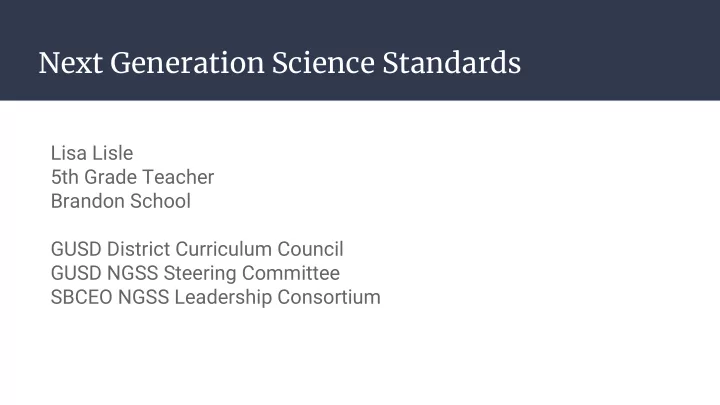

Next Generation Science Standards Lisa Lisle 5th Grade Teacher Brandon School GUSD District Curriculum Council GUSD NGSS Steering Committee SBCEO NGSS Leadership Consortium
A shift is happening…... 2019
The 3 Strands of the NGSS (3-Dimensional Learning) 1. Science and Engineering Practices (SEP) 2. Crosscutting Concepts (CC) 3. Disciplinary Core Ideas (DCI)
Science and 1. Asking questions (for science) and Engineering Practices defining problems (for engineering) 2. Developing and using models 3. Planning and carrying out (Mathematical Standards of Practice) investigations 4. Analyzing and interpreting data 5. Using mathematics and computational thinking 6. Constructing explanations (for science) and designing solutions (for engineering) 7. Engaging in argument from evidence 8. Obtaining, evaluating, and communicating information
Crosscutting 1. Patterns 2. Cause and effect Concepts 3. Scale, proportion, and quantity (Universal Themes) 4. Systems and system models 5. Energy and matter: Flows, cycles, and conservation 6. Structure and function 7. Stability and change
1. Depth not Breadth Disciplinary 2. Provide a key tool for understanding or investigating more complex ideas and solving Core Ideas problems. 3. Relate to the interests and life experiences of students or be connected to societal or personal concerns that require scientific or technical knowledge. 4. Be teachable and learnable over multiple grades. Progressions are K-2, 3-5, 6-8,9-12
What does this look like in a classroom?
ENGAGE ● Observable events in nature (or our lives) that connect to multiple NGSS disciplinary core ideas Start with a PHENOMENON ● observable events in nature (or our lives) that connect to multiple NGSS disciplinary core ideas ● Throughout a unit, students work towards explaining the science concepts behind the phenomenon in their own. ● Does not have to be a video. Often hands-on.
Record Observations and Questions
Explore Have a common, concrete, ● meaningful experience. ● Conduct activities, predict, form hypotheses Record observations ● Try many alternatives to ● solve a problem and discuss them with others Share ideas ●
Explain Students have an opportunity to: Use the “Language of the ● Discipline” Explain possible solutions ● Listen critically to others’ ● explanations Question others’ ● explanations Use recorded observations ●
Elaborate Students have the opportunity to: Apply explanations in new, ● but similar situations Use previous information to ● ask questions, propose solutions and design experiments (This often looks like ● engineering)
Students have the opportunity to: Evaluate ● Provide reasonable responses and explanations to events or phenomena ● Demonstrate understanding or knowledge of concepts and skills ● Answer open ended questions by using observations, evidence, and previously accepted explanations
Steps for DCC and NGSS Steering ● Committee spearheading implementing the implementation. NGSS in GUSD Phenomenon training for ● teachers in Spring 2018 NGSS 101 PD for teachers in ● November 2018 Conceptual Shifts and SEP’s ● training in January 2019
Piloting for Adoption Pilot January through ● May of this year Adopt for Fall 2019 ● Two programs ●
Recommend
More recommend